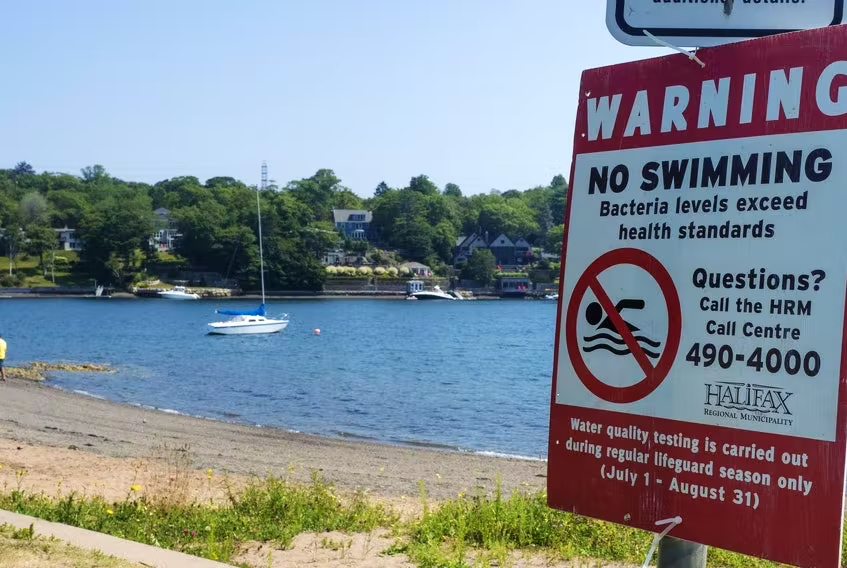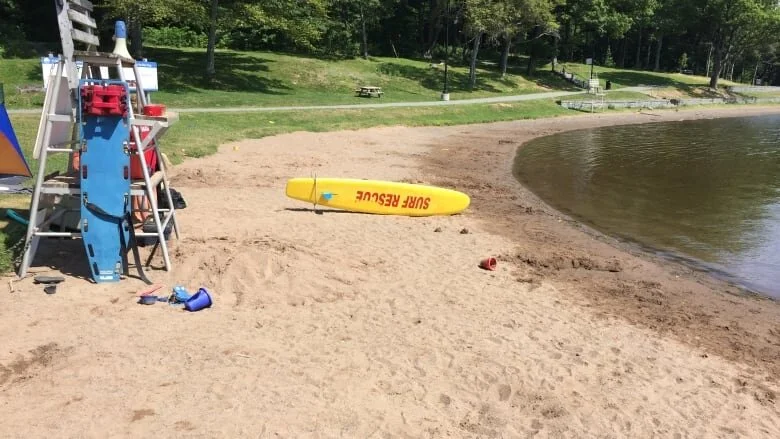Before Jennifer Steele and her husband moved into their home on Springfield Estates park in Middle Sackville, N.S., in 2013, they knew there was an issue with the water. She says she was told by someone else in the mobile home park that there was some "history" there. But it was affordable, she said. So they bought it.
No need to stay out of all water, but use caution as blue-green algae reports increase
Human waste behind E. coli issue in Lower Sackville's First Lake, report finds
Human waste is to blame for high levels of E. coli bacteria at First Lake in Lower Sackville, N.S., according to a report commissioned by the Halifax Regional Municipality. A popular beach on the lake was removed from the municipality's beach supervision program in 2020 because of high bacteria levels, so no lifeguards have been monitoring the swimming area and the water isn't regularly tested by the municipality.
2 Halifax-area lakes closed due to high bacteria levels
Two lakes in the Halifax-area are closed to swimming after high bacteria levels were found in the water. Kearney Lake Beach and Albro Lake Beach – both supervised beaches -- are closed until further notice. A municipal news release Thursday said recent test results show bacteria levels at the beaches exceed Health Canada swimming guidelines.
Proposed rules for mobile home parks in Halifax come as a relief to residents
On a summer morning two years ago, Susan Doyle turned on the tap to run a bath — and was greeted with a splash of dark water. "It was black as tar, the water. And I'm like, 'Oh my goodness,'" Doyle said in a recent interview at her Woodbine Park mobile home community in Beaver Bank. After 13 years of winding its way through city hall, a proposed Halifax bylaw would outline construction requirements and service standards for so-called "land-lease communities" like Woodbine Park.
Halifax providing drinking water to residents whose wells are going dry
The Halifax Regional Municipality is making drinking water available to people whose wells are going dry. Each household can receive two litres per person per day, plus one litre per day per pet, and residents can collect one week's supply at a time. Beginning Aug. 16, residents can get drinkable water at six different fire stations each Tuesday from 6 p.m. to 8 p.m., except station 38 and 42, which have different hours:
Warning issued for possible blue-green algae bloom at Cunard Lake Beach
Halifax Regional Municipality is warning people to avoid swimming at Cunard Lake Beach in Halifax due to a possible blue-green algae bloom. Blue-green algae, or cyanobacteria, are microscopic bacteria that live in surface water like lakes, ponds, rivers and streams that can be dangerous to people and pets. The organisms can multiply rapidly during the hot summer months and may release toxins into the water when the blooms die.
High bacteria levels close Lake Echo Beach to swimmers
The Halifax Regional Municipality (HRM) has closed Lake Echo Beach for swimming after confirming high levels of bacteria in the water. In a news release, HRM said a recent test shows bacteria levels at the beach exceed Health Canada’s swimming guidelines. The beach is closed for swimming until further notice. However, HRM staff will continue testing the water until bacteria levels return to safe levels and will notify the public.
Blue-green algae bloom warning for Penhorn Lake
The Halifax Regional Municipality is warning of a blue-green algae bloom at Penhorn Beach in Dartmouth. The city is warning people not to swim in the lake and to keep pets out as well. Lake users are urged to take the following precautions: Avoid water contact. If contact occurs, wash with tap water as soon as possible. Do not swim or wade (or allow your pets to swim or wade) in the water. Avoid consuming water from the lake. Avoid consuming fish from the lake.
Penhorn Lake Beach closed to swimming
Penhorn Lake Beach is a supervised beach. Municipal staff regularly test the water quality at all supervised municipal beaches, as well as two unsupervised beaches, during the summer months. Recent test results indicate bacteria levels at this beach exceed Health Canada swimming guidelines. High bacteria levels can be caused by a number of factors, including dogs, birds, wildlife, and high temperatures. Staff will continue testing the water until bacteria levels return to safe levels. The municipality will advise residents when the beach reopens.
High bacteria levels close Chocolate Lake Beach to swimmers
The Halifax Regional Municipality (HRM) has closed Chocolate Lake Beach for swimming after confirming high levels of bacteria in the water. In a news release, HRM said recent test shows bacteria levels at the beach exceed Health Canada’s swimming guidelines. The beach is closed for swimming until further notice. However, HRM staff will continue testing the water until bacteria levels return to safe levels and will notify the public.
Halifax beach closed due to high bacteria levels
Halifax Regional Municipality is warning residents that Chocolate Lake beach is closed due to high levels of bacteria in the water. Officials say the beach is closed to swimming until further notice. Recent municipal testing shows levels of bacteria in the water exceeding Health Canada swimming guidelines. Officials say high bacteria levels can be caused by a variety of factors, including dogs, birds, other wildlife and high temperatures.
HRM closes Kinap, Penhorn beaches to swimming
Halifax Regional Municipality has closed two supervised beaches to swimming until further notice because of high bacteria levels in the water. The municipality announced Saturday that bacteria levels at Kinap Beach in Porters Lake exceed Health Canada’s swimming guidelines. Friday evening, the municipality issued a news release saying Penhorn Lake Beach in Dartmouth had been closed. HRM regularly tests the water quality at all supervised municipal beaches, as well as two unsupervised beaches, during the summer.
New study aims to uncover source of E. coli contamination in First Lake
Is it poop from humans, dogs, waterfowl or another source that keeps fouling the waters of First Lake in Lower Sackville, N.S.? That's one of the questions an upcoming study will tackle. The Halifax Regional Municipality is seeking a company to conduct a study to figure out how much fecal bacteria is in the lake and where it's coming from, as well as to make recommendations on how to decrease the pollution.
Birch Cove Beach reopens after blue-green algae advisory lifted
A blue-green algae risk advisory previously in effect for Birch Cove Beach at Dartmouth's Lake Banook has been lifted, according to a release Wednesday from the Halifax Regional Municipality. Blue-green algae, or cyanobacteria, occurs in freshwater environments and can multiply rapidly during the summer. Some types of blue-green algae produce toxins during blooms. Toxins may be released into the water when the blooms decay. However, test results showed no toxin-producing blue-green algae in samples collected.
Risk advisory in effect for Lake Banook after possible algae bloom
Swimmers are being asked to avoid Dartmouth's popular Lake Banook due to a possible blue-green algae bloom. A release from the Halifax Regional Municipality Sunday afternoon announced a risk advisory was in effect for Birch Cove Beach, and people were asked to avoid swimming there until further notice. City staff are currently investigating whether or not it is a toxin-producing algae, the release said. Blue-green algae naturally occurs in freshwater environments and can multiply rapidly during the summer, leading to extensive growth called a bloom. Some types of this algae produce toxins during blooms and those toxins may leak into the water when the bloom fades, the release said.
Chocolate Lake beach closed, toxic algae bloom confirmed at Cunard Lake
Chocolate Lake Beach is closed to swimming until further notice as the municipality tests samples to see if a toxin-producing algae is present in the water, according the Halifax Regional Municipality. People are advised to avoid any contact with the lake water, and that warning extends to pets, since a bloom is suspected. The popular spot is one of three beaches in the municipality now closed.
Halifax to probe problems around Williams Lake's falling water levels
Halifax’s vanishing Williams Lake could fill up again with a little help from the city, according to nearby residents. The water level had dropped by about 1.3 metres since late May when The Chronicle Herald featured one of the city’s favourite swimming lakes literally drying up on its front page in early September. But now a potential fix is being investigated for a dam that’s allowing water to flow too quickly to the sea.
How microbes could help clean up Nova Scotia's abandoned mines
Researchers from three Maritime universities are hoping microbes collected from the bottom of a lake near an abandoned gold mine in Dartmouth, N.S., will provide a model for how to clean up contaminated sites across the province in a quicker and less-intrusive way. Last May, a research team took a boat to the middle of Lake Charles, not far from the former Montague gold mine, where extensive mining took place from 1860 to about 1940.
COVID-19 making it harder for Harrietsfield residents to access drinking water
The COVID-19 pandemic has made it even harder for some residents in Harrietsfield, N.S., to get clean drinking water. The Halifax-area community's well water has been contaminated for years, forcing dozens of households to get potable water from nearby St. Paul's United Church or bring it home from work. With many businesses shut down and people working from home, that's no longer an option, said resident Marlene Brown.





















